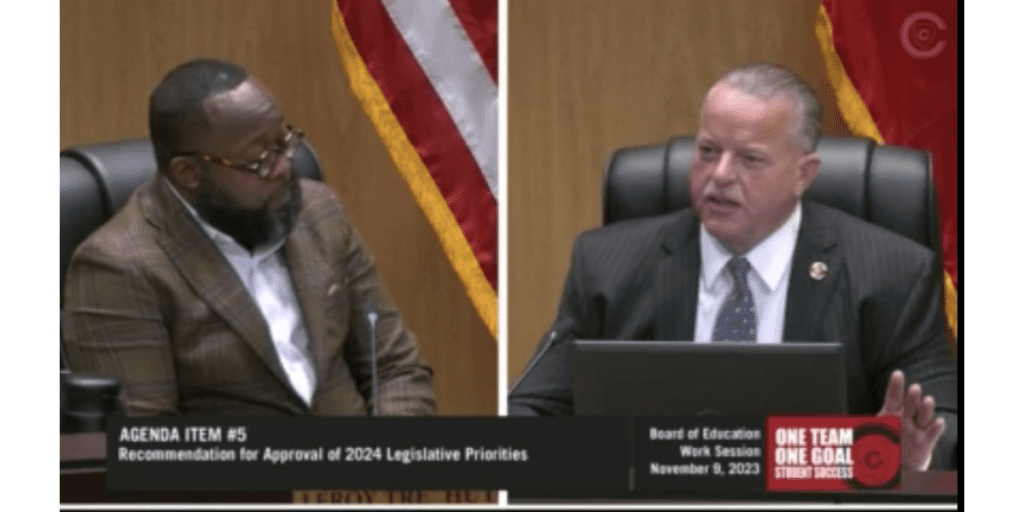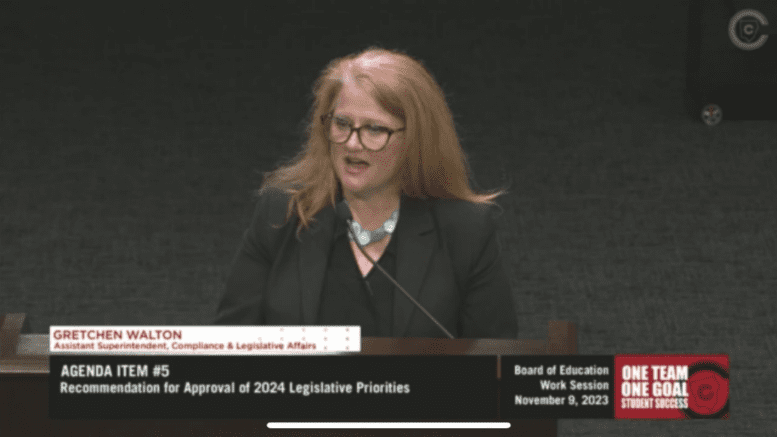By Rebecca Gaunt
Cobb County schools Superintendent Chris Ragsdale shared his priorities for the 2024 legislative session at Thursday’s work session.
One of the big ones is a request for a state rating system for books, similar to ratings for movies, to prevent inappropriate materials being accessed by students in K-12 classrooms.
“I think it just makes common sense to put some kind of rating system in there such that schools, school districts, will be able to reference that, and hopefully then book manufacturers can implement that as well, at least within the state of Georgia,” Ragsdale said.
“Inappropriate according to who?” asked board member Becky Sayler, who unsuccessfully introduced a plan to update the district’s decade-old book removal policy last month.
Sayler objected to the term “inappropriate” as overly broad and open to interpretation, but Ragsdale and board member Randy Scamihorn disagreed, saying that if the priority was taken up in the legislature, the final wording would be decided by lawmakers.
Maintaining the funding for the Georgia Network of Educational and Therapeutic Supports (GNETS) carried over from last year as another top priority.
GNETS is a statewide program that serves students with severe social, emotional, and behavioral problems who have difficulty in traditional classroom settings.
H.A.V.E.N. Academy in Mableton is the site that serves Cobb County, Douglas County and Marietta City.
The program is funded by grants, but proposed changes to the funding mechanism by the state, planned for 2025, would cut that funding by 70%, reported Gretchen Walton, the assistant superintendent of compliance and legislative affairs.
“I have committed to our employees that we will fund this for our students…and I say our students because we have students from multiple other districts, not just one,” Ragsdale said.
“We’re gonna have to add money as a line item to enhance the funding to maintain GNETS for us and our students, but it’s still going to be a cut,” he continued.
Ragsdale said he remained hopeful that the state funding would remain at its current level, but if it doesn’t, how those changes would affect students coming in from other districts would be considered at that time.
“We’re probably talking about some of the most vulnerable of our student population statewide, and then specifically for the three local education agencies that currently work through the Cobb system,” said board member Leroy Tre’ Hutchins.

The requirement of fiscal notes attached to any education legislation that would affect school funding is a new addition to the list.
A previous mandate from the state required dyslexia screening and also funded the screening process. Cobb is now asking the state to fund the needed intervention that will follow such a determination.
Walton said the district is also seeking an annual categorical safety and security grant for planning and budget purposes.
“Right now we receive safety and security funding piecemeal, whenever the state decides it wants to give it to us. So I think of it as grandad coming to visit and he gives us a twenty,” Walton said.
Sayler requested to add an additional item to the list: adding an opportunity weight in the Quality Basic Education (QBE) formula to account for children living in poverty, which is a priority for the Georgia Board of Education and state Superintendent Richard Woods.
Walton responded that historically the district has been cautious about trying to alter QBE because it’s not known how that will affect the final result.
Ragsdale expressed concern that modifying QBE could lower funding because “increased funding somewhere comes from decreased funding somewhere else.”
Sayler responded that groups currently advocating on the matter intend for the money to come from additional sources, such as the state surplus, rather than being reallocated.
Other priorities that carried over from previous years:
- Opposing the diversion of public education funding via school vouchers
- Sustaining the Teacher Retirement System (TRS) as currently structured
- Incentivizing higher education for teachers
- Applying charter waivers to strategic waiver systems such as CCSD. Charter systems automatically get to waive everything that is legally allowed to be waived under Title 20, according to Walton. Strategic waiver systems have to go back to the state every time they make a waiver. The waivers provide flexibility in following state laws and regulations, such as maximum class size, in exchange for meeting annual performance targets
In a series of motions, Sayler attempted to amend the priorities at the evening session and to postpone the vote to allow for public input. All failed 4-3 along party lines.
Scamihorn went on record to tell her this should have been worked out in the work session.
“I’d just like to point out I tried. So this is the next step in trying to do that,” Sayler said.

Rebecca Gaunt earned a degree in journalism from the University of Georgia and a master’s degree in education from Oglethorpe University. After teaching elementary school for several years, she returned to writing. She lives in Marietta with her husband, son, two cats, and a dog. In her spare time, she loves to read, binge Netflix and travel.
